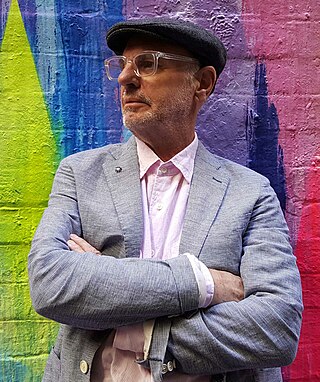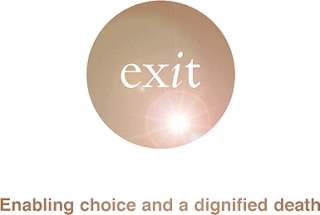Related Research Articles

Assisted suicide – sometimes referred to as medical aid in dying – means a procedure in which people take medications to end their own lives with the help of others, usually medical professionals. The term usually refers to physician-assisted suicide (PAS), which is an end of life measure for a person suffering a painful, terminal illness. Once it is determined that the person's situation qualifies under the physician-assisted suicide laws for that location, the physician's assistance is usually limited to writing a prescription for a lethal dose of drugs.

Philip Haig Nitschke is an Australian humanist, author, former physician, and founder and director of the pro-euthanasia group Exit International. He campaigned successfully to have a legal euthanasia law passed in Australia's Northern Territory and assisted four people in ending their lives before the law was overturned by the Government of Australia. Nitschke was the first doctor in the world to administer a legal, voluntary, lethal injection, after which the patient activated the syringe using a computer. Nitschke states that he and his group are regularly subject to harassment by authorities. In 2015, Nitschke burned his medical practising certificate in response to what he saw as onerous conditions that violated his right to free speech, imposed on him by the Medical Board of Australia. Nitschke has been referred to in the media as "Dr Death" or "the Elon Musk of assisted suicide".
Pentobarbital (US) or pentobarbitone is a short-acting barbiturate typically used as a sedative, a preanesthetic, and to control convulsions in emergencies. It can also be used for short-term treatment of insomnia but has been largely replaced by the benzodiazepine family of drugs.
Voluntary euthanasia is the ending of a person's life at their request in order to relieve them of suffering. Voluntary euthanasia and physician-assisted suicide (PAS) have been the focus of intense debate in recent years. Some forms of voluntary euthanasia are legal in Australia, Belgium, Canada, Colombia, Luxembourg, the Netherlands, New Zealand, and Spain.

Nancy Crick was an Australian woman who committed suicide by drinking a solution of Nembutal, while surrounded by 21 voluntary euthanasia supporters and family. Nancy was supported in her decision by euthanasia activist Dr. Philip Nitschke. Nancy's death became highly politicised after her autopsy results were leaked to the media. This was because the autopsy showed that at that the time of her death, Nancy was 'cancer free' but had an inoperable bowel condition that may have been the cause of her suicide-inducing pain.
The World Federation of Right to Die Societies is an international federation of associations that promote access to voluntary euthanasia. It holds regular international meetings on dying and death.

Dignity in Dying is a United Kingdom nationwide campaigning organisation. It is funded by voluntary contributions from members of the public, and as of December 2010, it claimed to have 25,000 actively subscribing supporters. The organisation declares it is independent of any political, religious or other affiliations, and has the stated primary aim of campaigning for individuals to have greater choice and more control over end-of-life decisions, so as to alleviate any suffering they may be undergoing as they near the end of their life.

Dignitas is a Swiss nonprofit organization providing physician-assisted suicide to members with terminal illness or severe physical or mental illness, supported by independent Swiss doctors. By the end of 2020, they had assisted 3,248 people with suicide at home within Switzerland and at Dignitas' house/flat near Zürich. They provide advisory work on palliative care, health care advance directives, suicide attempt prevention, and legislation for right-to-die laws around the world.

Exit International is an international non-profit organisation advocating legalisation of voluntary euthanasia and assisted suicide. It was previously known as the Voluntary Euthanasia Research Foundation.

The legality of euthanasia varies between countries and territories. Efforts to change government policies on euthanasia of humans in the 20th and 21st centuries have met with limited success in Western countries. Human euthanasia policies have also been developed by a variety of NGOs, most advocacy organisations although medical associations express a range of perspectives, and supporters of palliative care broadly oppose euthanasia.
Right to Die?, also known as The Suicide Tourist, is a documentary film directed by Canadian John Zaritsky about the assisted suicide of Craig Colby Ewert (1947–2006), a 59-year-old retired university professor who suffered from amyotrophic lateral sclerosis.
A euthanasia device is a machine engineered to allow an individual to die quickly with minimal pain. The most common devices are those designed to help terminally ill people die by voluntary euthanasia or assisted suicide without prolonged pain. They may be operated by a second party, such as a physician, or by the person wishing to die. There is an ongoing debate on the ethics of euthanasia and the use of euthanasia devices.
Euthanasia became legal in New Zealand when the End of Life Choice Act 2019 took full effect on 7 November 2021. It is illegal to "aid and abet suicide" under Section 179 of the New Zealand Crimes Act 1961. The clauses of this act make it an offence to "incite, procure or counsel" and "aid and abet" someone else to commit suicide, regardless of whether a suicide attempt is made or not. Section 179 covers both coercion to undertake assisted suicide and true suicide, such as that caused by bullying. This will not change under the End of Life Choices Act 2019, which has provisions on coercion of terminally ill people.

Assisted suicide is suicide with the aid of another person. In the United States, the term "assisted suicide" is typically used to describe what proponents refer to as medical aid in dying, in which terminally ill adults are prescribed and self-administer barbiturates if they feel that they are suffering significantly. The term is often used interchangeably with physician-assisted suicide (PAS), "physician-assisted dying", "physician-assisted death", "assisted death" and "medical aid in dying" (MAiD).
Active euthanasia is illegal in Switzerland, but supplying the means for dying is legal, as long as the action which directly causes death is performed by the one wishing to die. Assisted suicide in the country has been legal since 1941, and Switzerland was the first country in the world to permit any kind of assisted dying. In 2014, a total of 752 assisted suicides were performed, compared to 1,029 non-assisted suicides ; most of the assisted suicides concerned elderly people suffering from a terminal disease. In what critics have termed suicide tourism, Swiss euthanasia organisations have been widely used by foreigners. As of 2008, German citizens were 60 percent of the total number of suicides assisted by the organisation Dignitas.
Betty and George Coumbias were a Canadian married couple who sought to become the first husband and wife to complete simultaneous suicides with legal authorization. They were featured in John Zaritsky's 2007 documentary, The Suicide Tourist. Although assisted suicide was illegal in Canada, they hoped to end their lives with the approval of the government of Switzerland.
Ludwig A. Minelli is a Swiss lawyer. He is the founder of Dignitas, an organization that helps permanently ill people to end life in a manner which relieves pain and suffering. He is also the founder and general secretary of the Swiss Society for the European Convention on Human Rights.

Switzerland had a standardised suicide rate of 10.7 per 100,000 as of 2015. The actual (non-standardised) rate was 12.5 in 2014.

Exit is a not-for-profit, pro-euthanasia organisation based in Scotland that lobbies for and provides information about voluntary euthanasia and assisted suicide. It has particularly focused on research and publication of works which provide information about suicide methods, including How to Die With Dignity, the first book published on the subject.
References
- ↑ Emmott, Robin; Hernández, Magdiel; Bremer, Catherine; Chiacu, Doina (2008-06-03). "Euthanasia tourists snap up pet shop drug in Mexico". Nuevo Laredo, Mexico: Reuters. Retrieved 2009-09-25.
- ↑ Davies, Julie-Anne, "Nitschke DIY kit upsets British", The Australian , April 20, 2009. They asked Dr. Philip Nitschke about it. "As revealed in The Australian last month, Exit members are obtaining Nembutal from an online mail order supplier in Mexico. Others travel to Mexico and smuggle the drug home in their luggage. The kits, which will retail for $50, include a syringe that allows users to extract half a millilitre of the solution. 'Clearly, sterility doesn't matter given that death is the desired outcome', Dr Nitschke said. 'People want reassurance they've not just bought a bottle of water.'"
- ↑ "News briefs from home and abroad" Archived 2009-08-08 at the Wayback Machine , The International Task Force on Euthanasia and Assisted Suicide, Year 2009, Volume 23, Number 3. "Australia's Dr. Death, Dr. Philip Nitschke, has been on the road proffering his latest invention, a do-it-yourself kit to test the quality and potency of the barbiturate Nembutal. ... So Nitschke tells the elderly and not-so-elderly that the drug is both available and cheap in Mexico. But not all Mexican vendors are reputable, so his euthanasia test kit is needed to make sure that people have the real thing and the potency is truly deadly. ..." [The Australian, 4/20/09]
- ↑ Mercy Killing Now Legal in Netherlands
- ↑ Michael Leidig & Philip Sherwell, "Swiss to crack down on suicide tourism," Telegraph (14 March 2004). Retrieved 4 May 2014.
- ↑ Kein Gesetz gegen Sterbetourismus Archived 2009-07-20 at the Wayback Machine Neue Zürcher Zeitung
- ↑ "Statistiken".
- ↑ Hurst, Samia A; Mauron, Alex (1 February 2003). "Assisted suicide and euthanasia in Switzerland: allowing a role for non-physicians". BMJ. 326 (7383): 271–273. doi:10.1136/bmj.326.7383.271. PMC 1125125 . PMID 12560284.
- ↑ Wenn Sie das trinken, gibt es kein Zurück Tagesspiegel.de Retrieved April 12, 2008
- ↑ "'One person a fortnight' travels to Dignitas from Britain to end their lives". Guardian. August 15, 2015. Retrieved August 17, 2015.
- ↑ "My brother chose to end his suffering". BBC News. 2008-10-29. Retrieved 2010-05-24.
- ↑ "More Britons seeking suicide help". BBC News. 2008-11-17. Retrieved 2010-05-24.
- ↑ Jacob M. Appel, "Next: Assisted Suicide for Healthy People," The Huffington Post (16 July 2009). Retrieved 4 May 2014.
- ↑ Lundin, Leigh (2009-08-02). "YOUthanasia". Criminal Brief. Retrieved 2009-08-27.
- ↑ "The Suicide Tourist", PBS Frontline, March 2, 2010.
- ↑ "Zurich votes to keep 'suicide tourism' alive". The Daily Telegraph. London. 2011-05-15.
- ↑ "Zurich voters keep "suicide tourism" alive," CBS News (15 May 2011). Retrieved 4 May 2014.
- ↑ "Zurich voters keep 'suicide tourism' alive". Fox News. 2011-05-15.
- 1 2 "Death with Dignity: the Laws & How to Access Them". Archived from the original on 10 November 2015. Retrieved 8 October 2015.
- ↑ "Oregon" . Retrieved 8 October 2015.[ permanent dead link ]
- ↑ Compassion & Choices of Washington. "Home - Compassion & Choices of Washington". Compassion & Choices of Washington. Archived from the original on 4 December 2010. Retrieved 8 October 2015.
- ↑ "Physician Assisted Death (PAD)". Vermont Ethics Network. Retrieved 8 October 2015.